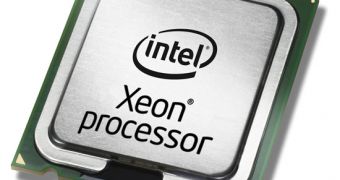There are two nice and relatively easy solutions when it comes to increasing the performance of a family of central processing units, CPUs for short, without going deep into their internal working and modifying their architecture. The first method would be to simply increase the running frequency and while this method is the simplest and guarantees some measure of performance boost, clock speeds can not be increased forever. The second and better method is to increase only the frequency associated with the frontside bus while maintaining or even lowering the internal CPU multiplicator in order to get the very same general CPU frequency or a slightly higher one.
Increasing the FSB frequency results in a big performance boost as data transferring speeds between the processing unity and the rest of the computer are much improved and exactly this is the way chosen by Intel when they announced a new generation of Xeon processors with FSB speeds of 1600MHz. The new Penryn based Xeons are available in both dual core and quad core versions with the E5472 and E5462 models to be the first quad core CPUs to use the 1600MHz frontside bus. The Xeon E5472 features a 3.0 GHz clock speed while the E5462 features a 2.8 GHz clock speed, which is not a big leap ahead form the speed point of view but may produce some pleasant surprises, performance wise. Both of these models come with an 80 watts thermal rating, just like the other processors that are using the E designation.
The Xeon E5462 will come with a price tag of $797 while the faster E5472 will cost $958 and both processors will be available in the last months of the year, just like the rest of the Penryn line of products. A dual core Penryn server intended processor featuring the faster 1600MHz frontside bus, the E5272 will hit the market in the same general period as the other Xeons, but this one will run at a 3.4GHz clock speed and will cost $1,172. The 1600Mhz Penryn based processing units will eventually be absorbed into the upcoming Seaburg chipset intended for servers which will feature support for dual PCUI Express full speed lanes as well as up to 128GB of system memory.

 14 DAY TRIAL //
14 DAY TRIAL //